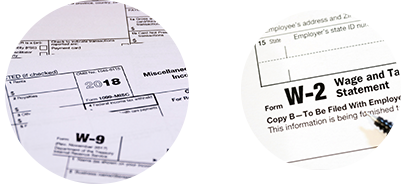
1099 Independent Contractor Compliance


As a flexible staffing company dedicated to providing efficient workforce solutions, Uniforce is a trusted resource for issues surrounding 1099 independent contractor compliance.
While the use of independent contractors may prove attractive as a measure to reduce or conserve payroll expenditures, there are strict guidelines that govern the classification of this workforce category, and stiff fines associated with violations and misclassification.
W2 vs. 1099 Independent Contractor.
There are very clear differences that govern the working relationship and financial responsibilities between employers, employees, and independent contractors.
W2 vs. 1099 refers to the difference in tax forms, with employees being W-2 form recipients and independent contractors each receiving a 1099. According to taxing authorities, whether or not the working relationship is consistent with how each type of worker is defined dictates compliance. W-2 employees have payroll taxes deducted by their employer, who pays the government on the employee’s behalf. Contractors are responsible for their own payroll taxes and expected to submit their own payments to the government.
Independent Contractor Misclassification.
What’s critical for companies that work with independent contractors is that they understand and observe appropriate guidelines consistent with proper classification.
Unlike employees who may receive training from the company, use company tools to accomplish tasks and adhere to an agreed upon schedule, these types of agreements with contractors are consistent with misclassification.
In other words, any business that believes that an independent is merely an employee who is paid differently and comes without the overhead of company benefits is mistaken. Many of the qualifications that define an independent contractor are what dictate a very different working relationship.
Here are some characteristics that define the role of an independent contractor:
- Set their own schedule.
- Work for more than one client.
- Supply their own tools and have their own performance processes.
- Accept tasks as they choose and cannot be directed about how to perform their task.
The liability to comes with independent contractor misclassification can be devastating. IRS audits are conducted regularly, as are state and federal Department of Labor (DOL) audits. Audits are typically conducted for a two to three year timeframe and misclassification findings are likely to produce penalties on top of requirements to pay back taxes owed by employer and employee.
W2 vs. 1099 Independent Contractor.
Once you fully understand the differences between an employee and an independent contractor, you are prepared to make an informed decision about the optimal staffing solution for you. Aside from the issue of liability and compliance, there are other factors to consider. If your company is considering to fill positions with independent contractors, it’s worth considering factors and risks beyond the cost differential. The IRS and Department of Labor constantly receive leads on employer 1099 misclassification business practices. An Independent Contractor that files an unemployment claim or doesn’t file its taxes sets off red flags to governing institutions. There are certainly situations that dictate that the investment in an employee relationship is preferred due to the fact that job may require such elements as corporate training and the reliability of a schedule set by the company. It also makes sense to consider company culture, and when the role of any given staff member is critical to the growth of your company, the best choice to engender a sense of loyalty is often to provide employment status and benefits.
If your company has questions or concerns about independent contractor compliance, Uniforce can help. After decades of providing staffing solutions, we are experts at helping clients determine when it’s best to use a contractor versus hiring an employee, or taking advantage of a third party staffing solution that reduces risk and offers greater flexibility. Uniforce can also assist by providing a proactive audit of your company’s independent contractor practices to inform you about best practices and the risks associated with current policies.
If you are seeking an independent contractor or employee relationship with
one or more of our clients, let’s connect.



